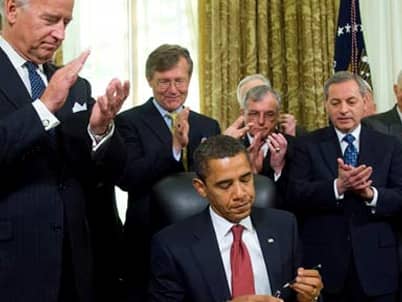But Obama has strangely established no real advantage in this area, whose importance is underscored by the fact that 67 percent of Americans tell the Pew Research Center: “it is important to me that a President has strong religious beliefs.”
According to Pew, fewer Americans said Obama was a Christian in July 2012 (49 percent) than in October 2008 (55 percent). Fewer still (45 percent) said they were comfortable with Obama’s faith. Almost as many (41 percent) who said they were comfortable with Romney’s Mormonism.
Why don’t more Americans recognize Obama’s Christian faith and feel comfortable with it?
Oft-cited reasons have become familiar. Some might simply not believe him. Or political opponents aim to “tar” him with another label, such as “non-Christian” or “Muslim.” Indeed, 17 percent describe Obama as Muslim, up from 12 percent in Oct. 2008.
These reasons alone, however, don’t fully account for the level of skepticism about Obama’s faith. Christians learn that “you shall know them by their fruits… every good tree brings forth good fruits” (Matthew 7:16-17). In Obama’s case, Christians are looking to see particular types of “fruit,” or outward signs, of the conversion experience Obama detailed when he ran for president the first time. When they don’t see evidence of a changed life or mindset, some question whether the newfound faith is really God-given and durable.
“There are some assessments made of Obama’s religion by practicing Christians who are very decent people who just believe in a different form of Protestant Christianity than he… was converted to,” says David Holmes, a retired College of William & Mary historian and author of The Faiths of the Postwar Presidents: From Truman to Obama (University of Georgia Press, 2012).
In the past, when Obama was more forthcoming about faith than he’s been lately, he professed confidence core Christian tenets.
“I am a Christian,” Obama told the New York Times in March 2008. “What that means for me is that I believe Jesus Christ died for my sins, and … [that through] his grace and his mercy and his power… I can achieve everlasting life.”
These beliefs grow out of his conversion story. Born to a Muslim-turned-atheist father and secular humanist mother, Obama received both Christian and Islamic training as a child, according to Holmes’ research, and was listed as Muslim in an Indonesian school’s records. (Holmes says the Muslim listing was an error). His mother taught him to view organized religion as “an expression of human culture… [a way] that man attempted to control the unknowable” (The Audacity of Hope, pp. 204-206). But Obama accepted Christ as Savior when he returned to Chicago after Harvard Law School. He was baptized at Rev. Jeremiah Wright’s Trinity United Church of Christ.
“Jeremiah Wright was undoubtedly the primary reason for his joining,” Holmes writes in his book. “Obama admired not only the pastor’s erudition but also the political dimensions he gave to the mission of Trinity.”
These might be stereotypical marks of faith, but they are nonetheless time-honored ones that resonate with a wide range of Christian communities. When Christians don’t see them, they wonder whether the convert might be backsliding, or might not have had a true conversion in the first place.
Obama has made faith a staple of his life as president. He confers with pastors as spiritual advisors, prays daily and receives Biblical meditations on his Blackberry. He attends worship services occasionally, either at St. John’s Church (Episcopal) near the White House, or in a family-only service at Camp David. He clearly hasn’t lost interest in spiritual matters.
But Obama doesn’t embrace basic practices that are thought to be second nature for converts. Church attendance marks one example.
“Churchgoing is a habit,” Holmes writes, “and Obama seems never quite to have acquired it.”
Testimony from Obama is rare, too. Despite having the world’s largest platform and a masterful way with words, he neglects to articulate exactly what he renounced, if anything, after coming to faith. If a life doesn’t change, believers wonder, then how is a conversion meaningful?
For Obama, spirituality has always had a strong social justice component, where faith fuels struggle alongside those on society’s margins. But his social justice emphasis predated his Christian faith, which makes faith ancillary to it. This leaves observers to wonder whether the president’s religious beliefs might be malleable or dispensable if they’re not essential to what he champions day in and day out.
Since his falling out with the Rev. Jeremiah Wright in 2008, Obama has readopted some of his forebears’ spiritual ways, including a willingness to wander. His maternal grandparents traded their Methodist upbringings for a non-theistic Unitarian church that at Christmas celebrated the births of Jesus, Buddha and Confucius. His mother walked away even from Unitarianism, Holmes writes, and his Muslim stepfather strayed from his faith’s codes. While Obama retains ties to Christianity writ large, he’s now unbound to any church organization that might shape him spiritually. When speaking to Christian audiences, he emphasizes universal values that transcend religious traditions – much as his mother used to do.
It’s impossible to know for sure why 19 percent of Americans are uncomfortable with Obama’s religion, according to Pew, or why a full 31 percent don’t know what religion he is. Part of it may be that Americans are sorting out what to make of an enigmatic convert in the White House. While most say they want a president with strong religious beliefs, it remains to be seen how they feel about one whose religious practices are continually evolving.
G. Jeffrey MacDonald is a freelance journalist, ordained minister and author of Thieves in the Temple: The Christian Church and the Selling of the American Soul (Basic Books, 2010). Check out his website!

